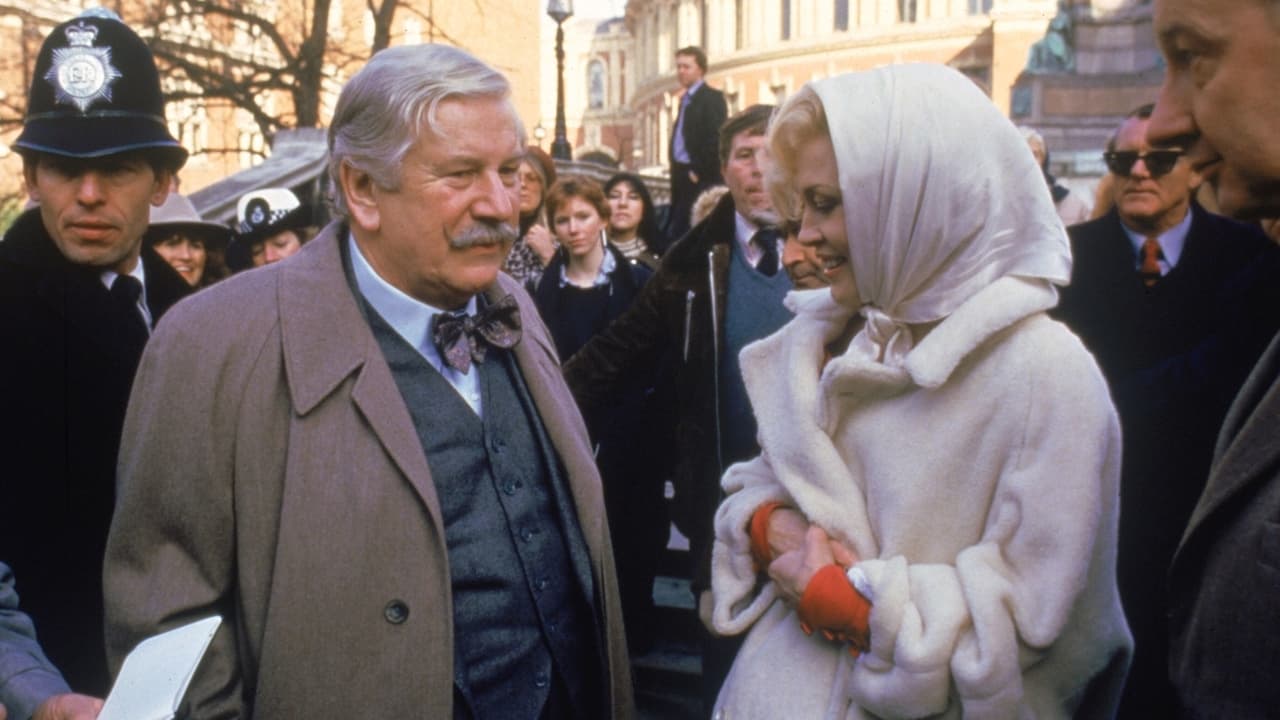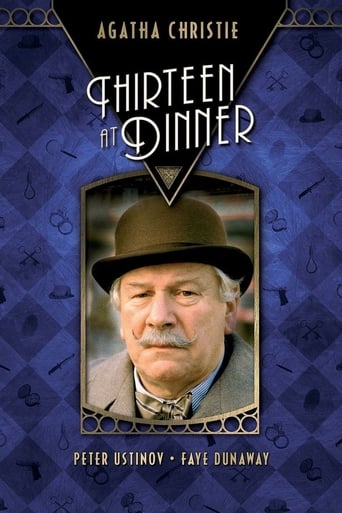Protraph
Lack of good storyline.
FrogGlace
In other words,this film is a surreal ride.
Bessie Smyth
Great story, amazing characters, superb action, enthralling cinematography. Yes, this is something I am glad I spent money on.
quim-scd
When I saw this movie for the first time I thought it had a strange feel to it, mainly due to being adapted to the eighties. Hercule Poirot is one of those characters who only seem to make sense in the 20's and 30's. I also felt the American tone given to it to be slightly inadequate. Yet a few classical elements still made it quite enjoyable and not least Ustinov's performance. Do you know that feeling of a particular actor being "the" character and not just playing it? Well, Ustinov is Poirot while, for instance, David Suchet merely plays it (which doesn't mean I dislike him as Poirot). In fact, all his Poirot movies (6 in total) are worth watching mainly because of him. Forget about the exaggerated Albert Finney, in guise as well as in acting, or the bland Suchet and his ridiculous walk. Ustinov portrays an affable yet shrewd man who gets his way through a good spirited disposition and remarkable ability to lead people into believing he can be manipulated. He, then, takes advantage of that feeling to dig in and find, through what is shown to him, that which is amiss. As for other actors I think Faye Dunaway is quite good if somewhat extravagant and Jonathan Cecil almost makes it by doing a slightly soberer Hastings than in subsequent films, "Dead Man's Folly" and "Murder in Three Acts", where he eventually lost his grip on the character by slipping into shear silliness. The plot is a progressive one, intensifying in suspense, all throughout, until Poirot's final disclosure. There are some cheesy bits such as Jake Slago's movie making or some of the music that doesn't sound appropriate to creating the right ambiance (I wonder why CBS won't remake the soundtrack, so as to improve the final result). All in all it still is a "must have" for Poirot fans, with the added curiosity of David Suchet's appearance as inspector Japp. 10 out of 10 may seem too much, but it comes as a tribute to Ustinov's wonderful acting.
TheLittleSongbird
I do much prefer Death on the Nile and Evil Under The Sun, but this is still enjoyable, adapted from the brilliant book Lord Edgeware Dies. Considering it was made for TV, it is glossily made, with some nice camera-work and lovely period detail, and is entertaining. Of course it isn't completely faithful to the book, the final solution scene while a very nice touch is a departure from the book. The script is fine, and so is the acting. Peter Ustinov, while bearing little resemblance in terms of looks to his novelistic counterpart, is thoroughly entertaining as Poirot, and is clearly enjoying himself. Faye Dunnaway is highly commendable in the duel roles of Jane Wilkinson and Carlotta Adams, and David Suchet(the present Poirot, who is actually truer to the Poirot in the books) is impressive as Japp. Bill Nighy is fairly good as Ronald, though he has done better work since. All in all, very good made for TV whodunit, not as good as Death on the Nile, but an improvement on Appointment With Death, which I still think is the weakest of the Ustinov outings. 7/10 Bethany Cox
bkoganbing
Agatha Christie's ageless Hercule Poirot once again stylishly portrayed by Peter Ustinov makes his television debut in Thirteen for Dinner. The famous Belgian sleuth is a guest on the David Frost Show with a pair of celebrities, Lee Horsley and Faye Dunaway who will shortly figure prominently in his next case.Although Ustinov is flawless as ever, the updating of the story from the time of Stanley Baldwin to the time of Margaret Thatcher makes the plot rather silly. Without giving anything away, let me say that what would have made sense for a motive in 1935 looks kind of ridiculous in 1985 given changing mores.The presence of David Suchet who played Hercule Poirot on the BBC in many adaptations of Agatha Christie as Inspector Japp in this film also gives it some interest. The scenes with Poirot and Suchet are good and Suchet is so good an actor you barely recognize him.Some Christie stories can be successfully updated. But sad to say Thirteen at Dinner is not one of them.
Iain-215
This adaptation of 'Lord Edgware Dies' takes Agatha Christie and Hercule Poirot into the eighties. Christie can survive updating but I'm not sure that Poirot can. He seems uncomfortable taken out of his period and set down again so much later. It is odd to see him on a TV chat show and in conversation with Lee Horsely's American actor character ('love you') but perhaps this is also because the last time I saw this version of Poirot he was firmly in period, in the thirties in 'Evil Under The Sun'. The time shift is disconcerting and the character is still most at home in the country mansions of the English aristocracy and the Gothic townhouse of the victim.Updating also affects (slightly) the motive for the murders. The motive would have been very powerful in the conservative thirties but not so much in the liberated eighties and there is some confusion over the method - the all important spectacles seem to have little real use or value here. On the whole though, Christie's original plot is followed quite closely but the script plods a bit and delivery is not all it could be - even Ustinov is given to rambling and add-libbing from time to time.The cast varies from mediocre (Diane Keen, Horsley) to really quite good (Dunaway, Pays and Nighy) and there is a rather wet and dismal portrayal of Hastings from Jonathan Cecil. It is interesting to see David Suchet as Japp. I wanted to like this more than I did but for me the later Suchet version is much preferable with a much stronger cast (even Dunaway is outdone by Helen Grace) and, as always with these versions, perfect period detail.

